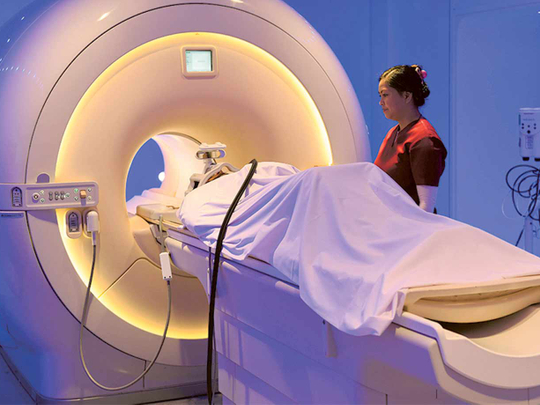
Dubai: Approximately 4,500 new cases of cancer are reported in a year in the UAE and the country aims to bring down cancer fatalities by nearly 18 per cent by 2021. Reducing the number of deaths due to cancer is one of the key performance indicators of the pillar of world-class health care of the UAE National Agenda.
On the occasion of World Cancer Day today, Gulf News examined a recent report on prostate cancer, published by the Health Authority of Abu Dhabi. It indicates that prostate cancer is the third most common cancer in the UAE affecting around 313 males out of every 100,000, said a leading urologist in Abu Dhabi.
In 2014, 1,768 new cases of prostate cancer were reported to the Abu Dhabi Central Cancer Registry. This is a worrying statistic, given that incidence rates are significantly higher in neighbouring Gulf countries. This indicates a lack of prostate cancer awareness in the region and the importance of educating the UAE population on screening and early detection.
Professor Dr Yasser Farahat, head of the Scientific Committee of the Emirates Urological Society and secretary-general of the Arab Urology Society, spoke to Gulf News on the challenges of prostate cancer in the UAE.
“The most significant challenge for medical professionals who work with prostate cancer patients in the UAE is late detection and treatment. When the cancer is localised to the prostate, it is curable if we can act quickly. Once it spreads, it becomes difficult to cure and manage,” cautioned Dr Farahat.
Early detection is key to managing prostate cancer. If the disease is diagnosed at an advanced stage, the treatment options become limited and the outcome is often poor.
He said that most prostate cancer patients in the UAE currently are those in advanced stages of the disease, making treatment less effective and costlier.
Elaborating on the need to increase awareness about this cancer that affects men, he said, “Every male above the age of 45 must take a prostate-specific antigen (PSA) test. A PSA test is a simple blood test which is used to screen for prostate cancer, helping with early detection. Utilising social media and other public channels can help educate the UAE population on the importance of PSA tests and how quickly they can be done.”
He added that for men who had tested positive for prostate cancer, the Emirates Urological society had launched a campaign dubbed ‘Every Voice Matters’. “This is a campaign that aims to raise the profile of men with prostate cancer in the UAE. We want to ensure that patients are receiving treatment and are doing well physically and physiologically,” said Dr Farahat.
Dr Farahat reiterated the point that a timely PSA test could be instrumental in saving thousands of lives and men must go ahead and undergo it. “How early we detect prostate cancer determines how successful the treatment will be. If treated early, the cure rates for prostate cancer are high and patients can benefit from the best outcome. If you are over the age of 50 in the UAE, it is important to take the PSA test regardless if you are experiencing symptoms or not. Symptoms of prostate cancer usually appear during the late stages of the disease, so waiting until you experience symptoms before you get screened is not a wise decision.”
Symptoms of prostate cancer
A need to urinate frequently, especially at night, sometimes urgently
Difficulty starting or holding back urination
Weak, dripping or interrupted flow of urine
Painful or burning urination
Difficulty in having an erection
The top five cancers in males in UAE
Leukaemia
Colorectal
Prostate
Non-Hodgkins
Brain cancer.
Top five cancers in females in UAE
Breast
Leukaemia
Colorectal
Thyroid
Uterus












